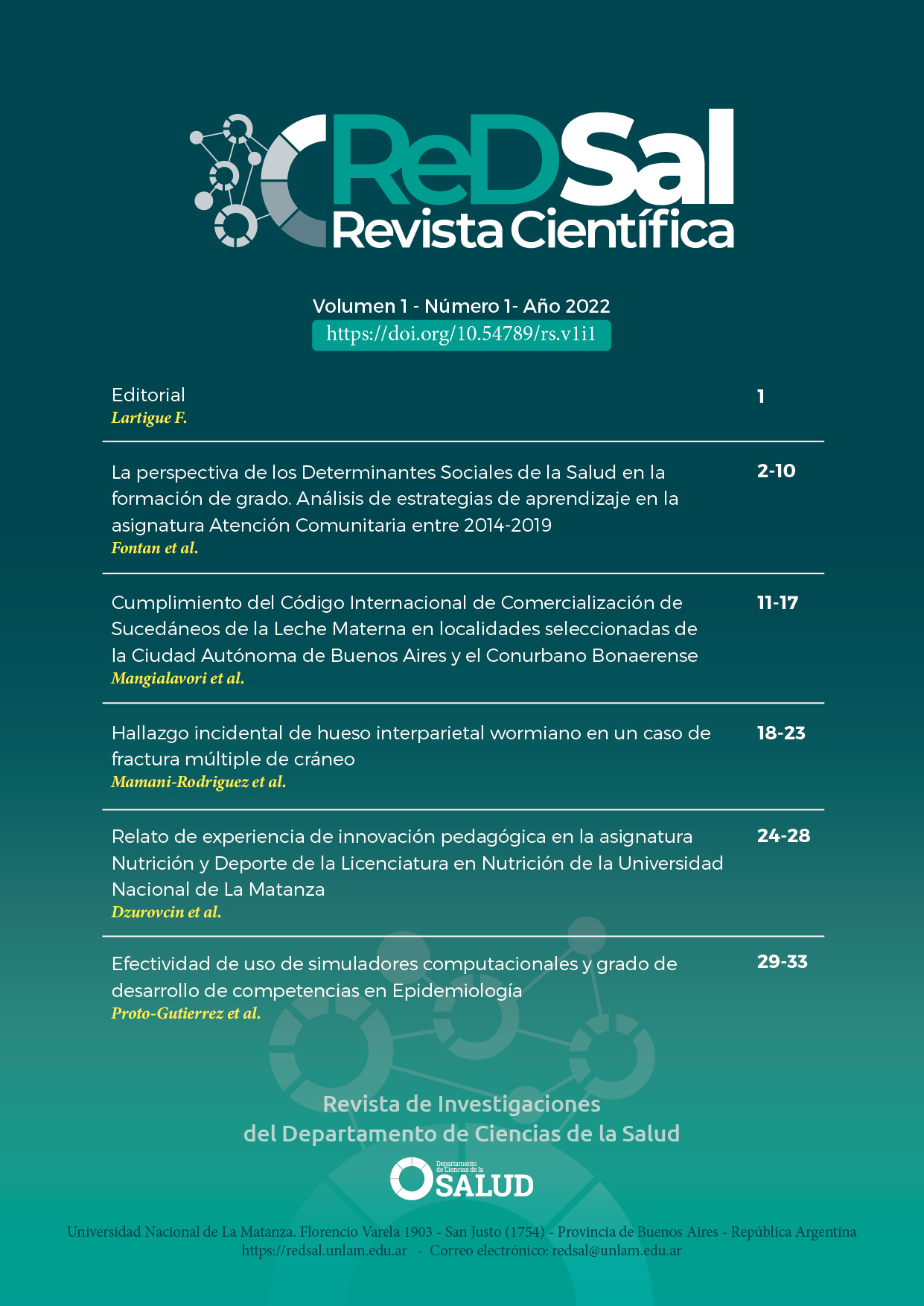Effectiveness of computer simulators use and degree of competence development in Epidemiology
DOI:
https://doi.org/10.54789/rs.v1i1.7Keywords:
Simulation, epidemiology and biostatistics, competency-based education, nursing education, learning, nursing education researchAbstract
This paper reports the preliminary results of the research project C2SAL-048 Effectiveness of the use of computer simulators and degree of development of competences in Epidemiology, carried out at the Department of Health Sciences in the Universidad Nacional de La Matanza. The objective of the study is to measure the effectiveness of the use of computer simulators according to the degree of development of competencies in Epidemiology students. To this aim, an experimental design consisting of a randomized sample of three groups of students is proposed. A two-way ANOVA is used in the analysis. Preliminary results show an improvement in the competencies evaluated, without the use of a computer simulator, so it is expected that the execution of the experimental design in the year 2022 will improve students´ scores when using two different types of simulators.
References
Aiello M, Martigani MD, López M, Gimenez V, José M, Proto Gutierrez F, León G. Uso de simuladores en la enseñanza de las Ciencias de la Salud. Universidad Nacional de La Matanza. 2013-2014.
Arras-Vota AM, Torres-Gastelú CA, García-Valcárcel-Muñoz-Repiso A. Competencias en Tecnologías de Información y Comunicación (TIC) de los estudiantes universitarios. Revista Latina de Comunicación Social [Internet]. 2011 [citado el 25 de marzo de 2022]. (66):1-26. Disponible en: https://www.redalyc.org/pdf/819/81921340018.pdf
Aiello M, Martigani M, Gimenez M, Proto Gutierrez F, León G. Los centros de simulación para la enseñanza de las Ciencias de la Salud. Universidad Nacional de La Matanza. 2015-2016
Gwirc S, Gimenez J, Proto Gutierrez F, Schwarcz S, Surbano V, Imperiale M, López M. Desarrollo de simuladores de baja fidelidad-alta eficiencia-bajo coste para prácticas preprofesionales y profesionales de Salud. Universidad Nacional de La Matanza. 2019-2020
Cataldi Z, Lage FJ, Dominighini C. Fundamentos para el uso de simulaciones en la enseñanza. Revista de Informática Educativa y Medios Audiovisuales [Internet]. 2013 [citado el 25 de marzo de 2022]. 10(17):8-16. Disponible en: http://laboratorios.fi.uba.ar/lie/Revista/Articulos/101017/A2mar2013.pdf
Surbano V, Albertolli M, Ciccone D, Gimenez J, Herrera M, López M, Mambrín A, Moreira K, Proto Gutierrez F, Scalioti A, Schwarcz S. Hub de I+D+i en Simulación Clínica. Universidad Nacional de La Matanza. 2020
Oficina Internacional de Educación. Enfoque por competencias. [Internet]. 2020. [citado el 25 de marzo de 2022]. Disponible en: http://www.ibe.unesco.org/es/temas/enfoque-por-competencias
Faul F, Erdfelder E, Buchner A, Lang A. Statistical power analyses using G*Power 3.1: Tests for Correlation and Regression Analyses. Behavior Research Methods, 41, 1149-1160. [Internet]. 2009. Disponible en: https://www.psychologie.hhu.de/arbeitsgruppen/allgemeine-psychologie-und-arbeitspsychologie/gpower.html

Downloads
Published
How to Cite
Issue
Section
License
Copyright (c) 2022 ReDSal

This work is licensed under a Creative Commons Attribution 4.0 International License.








